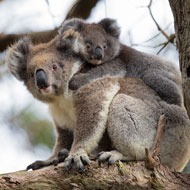Koala genome helps to inform conservation efforts

Koalas face many threats to their survival, including habitat loss, road traffic accidents, dog attacks, chlamydia and koala retrovirus.
Scientists have sequenced the full genome of the koala for the first time, offering unprecedented insights into their long-term survival.
A team of 54 scientists, from 29 institutions, in seven countries, sequenced over 3.4 billion base pairs and 26,000 genes in the koala genome.
Using new technology, the team were able to create the best marsupial genome to date, with an accuracy of 95.1 per cent putting it on a par with the quality of the human genome. The new information it provides could help to inform conservation efforts and treat disease.
Classified as ‘vulnerable’, koalas face many threats to their survival, including habitat loss, road traffic accidents, dog attacks, chlamydia and koala retrovirus (KoRV).
Findings published in Nature Genetics could lead to the development of a vaccine to fight diseases, including chlamydia.
Antimicrobial properties
Scientists were able to characterise the main components of a koala’s milk; identifying the genes that allow it to fine-tune the protein composition to meet their Joey’s changing needs throughout the lactation stages.
It appears to have an antimicrobial role, which is active against a range of bacterial and fungal species, including Chlamydia pecorum, the strain the causes ocular and reproductive disease. This discovery may also have applications for human health.
Dietary specialists
The study also shed light on how koalas are able to live on a diet of toxic eucalyptus leaves. Koalas were found to have two large expansions in a gene family that is known to be integral to detoxification.
These genes were expressed in many koala tissues, particularly the liver, which suggests they are important for detoxification and may have allowed koalas to become dietary specialists.
Going forward
Professor Rebecca Johnson, Director of the Australian Museum Research Institute, commented: “Our next efforts must be in the application of these findings to genetically manage koala populations and advance the treatment of the diseases affecting koalas, with the goal of conserving this very important species.”
The data has been deposited into public databases and made freely available to scientists around the world.



 HMRC has invited feedback to its communications regarding the employment status of locum vets and vet nurses.
HMRC has invited feedback to its communications regarding the employment status of locum vets and vet nurses.